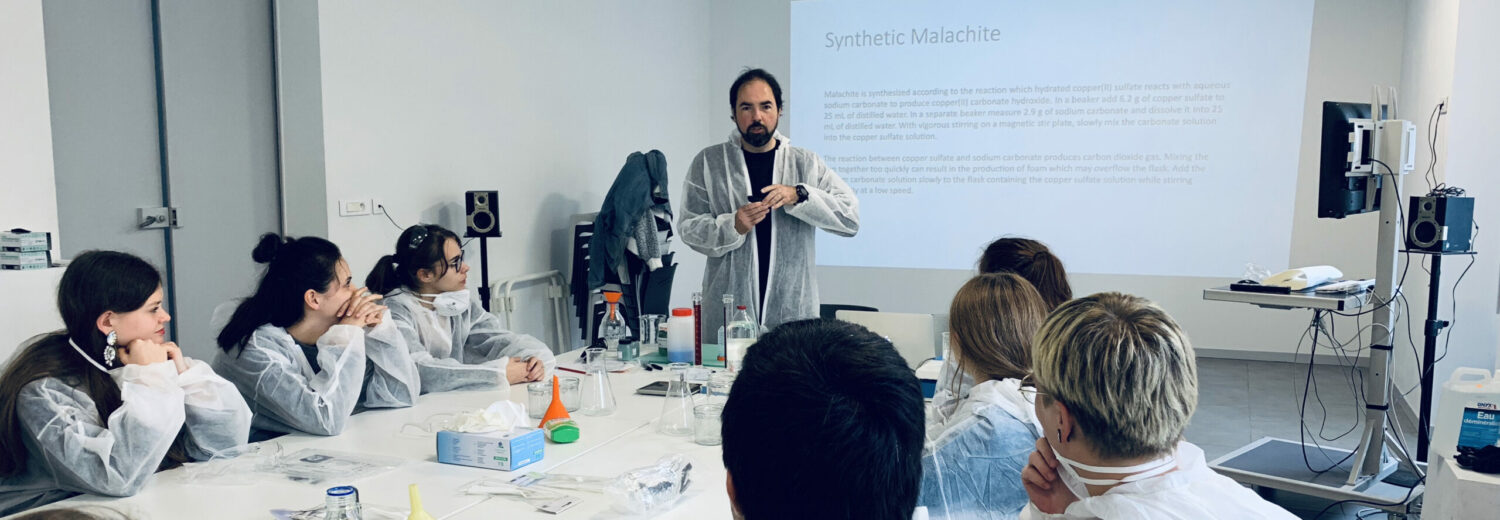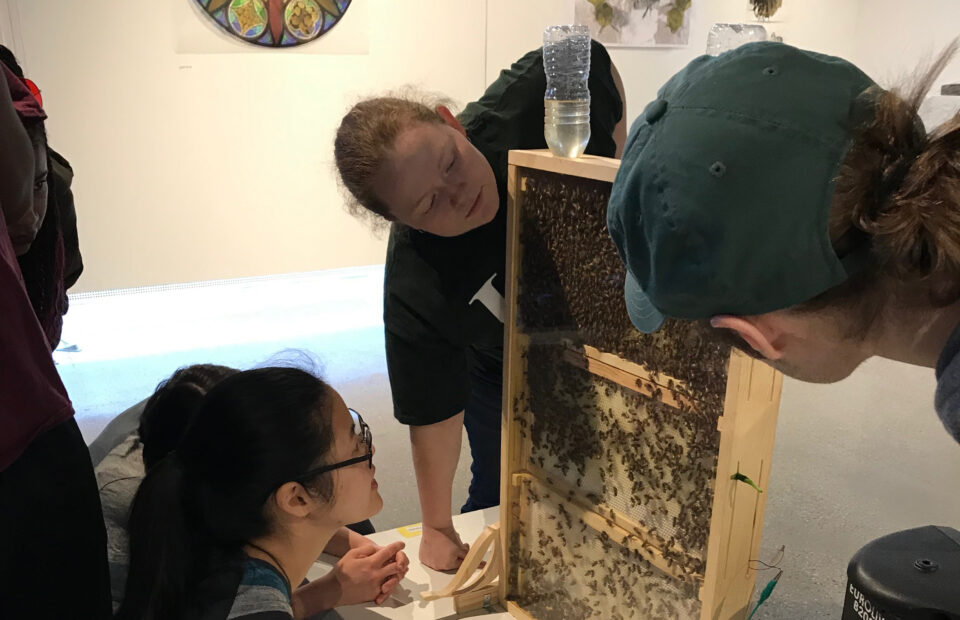STA 380 : Sec. 001
M/W 3:00-5:50
Kresge Art Center, RM 37 & RM 5
Fall 2019
Course Credits: 3
Instructor: Professor Adam Brown
Office: Room 27B, Kresge Art Center
Office hours: Tuesday 10-noon (office or the Intermedia Lab, Room 5) or by appointment
E-mail: brown293@msu.edu (preferred method of contact)
Connect to course on D2L
This is an introductory electronic and intermedia art production course designed to explore the intersection of art, science, technology and culture. Lectures, workshops and activities will address how knowledge is acquired, produced, distributed and incorporated into artistic practice. In addition, current trends within electronic and hybrid media and their relationship to Intermedia will be discussed. Some of these concepts will include investigations of topics such as digital imaging, interactivity, sound, and hybrid media. Class time will consist of artist screenings, technical lectures/workshops and creative projects as well as the practical use of digital tools. STA 380 is intended to provide a foundation for more advanced study in Electronic Art and Intermedia.
No prior computer experience is necessary, but it is recommended that you have a basic knowledge of Macintosh OS or Windows.
Course Objectives:
• Develop an epistemic methodology by incorporating research, experimentation, experience and play into the art process.
• Cultivate and understanding about the relationship between art and science.
• Develop strategies to work with computer software and hardware as it relates to contemporary art practice.
• Learn how to communicate ideas using digital tools.
• Understand the history of Intermedia
Course Requirements:
• Students must complete a series of projects and class workshops.
• Maintain a comprehensive notebook.
• Actively participate in class critique.
• Radical Walks: Throughout the session we will be visiting different labs and research facilities to inform our creative process.
• Write a well-researched artist statement.
• Spend at least 5 hours per week outside of scheduled class time on projects.
• Attend 2 lectures from the AAHD Lecture Series.
• Take detailed notes
Students are expected to regularly consult the course website for project and homework due dates. You should expect that the schedule will be adjusted periodically throughout the semester, and it is your responsibility to stay informed via the website and regular class assignments.
Reading Assignments and Lectures:
Reading assignments will be comprised of articles, books and web pages. The assigned reading materials and guest lectures are designed to complement the imaginative process and provide a context as well as inspiration for creative projects. Students are expected to have the readings and a corresponding 2-3 paragraph written reaction posted to D2L completed before class as indicated on the schedule.
Participation and Critique:
It is very important that students come to class prepared and participate to their fullest level of ability. Group critique and discussion is an essential tool for developing comprehensive artistic knowledge and vocabulary. Therefore, it is critical that students learn how to talk about their own art and the work of other artists. During critique and class discussion, strive to offer constructive feedback. Listen to the comments made by your peers and the instructor to evaluate the effectiveness of your work. It is important that you express ideas clearly, and have fun. Projects must be complete to be included in a critique.
Please pick up after yourself and keep the computer lab clean.
Phone use, texting, e-mailing, and non-course related web surfing is not permitted during class time.
Evaluation and Grades:
-
attend class regularly—not missing more than a week’s worth of classes;
-
meet due dates for all major assignments;
-
participate in all in-class exercises and activities;
-
complete all informal, writing assignments (e.g. reading reactions);
-
give thoughtful peer feedback during class critique and work faithfully with your group on other collaborative tasks;
-
sustained effort and investment on each project and workshop;
-
make substantive revisions to your projects based on critique;
-
attend 2 lectures outside of class indicated in the course calendar;
-
submit your final portfolio on time.
Projects will be evaluated on the basis of:
• Technical and conceptual quality
• Evidence of the incorporation of thoughtful research into the art
• Development throughout the course (strive for excellence)
• Quality of documentation
• It is expected that all work will be revised and all work will be re-evaluated
• All projects must be documented online to receive a grade.
Grades will be computed according to the following breakdown:
70% Projects
20% Workshops/Participation/Attendance
10% Writing/reading responses
Attendance:
Attendance is mandatory. Interaction and collaboration are an important aspect of the learning process and are critical for establishing trust among your peers. Please note that three unexcused absences are permitted without penalty. After the third unexcused absence, your grade will be reduced by a half letter grade with each absence. Being late to class is very disruptive. Please make sure that you arrive to class on time. Attendance will be taken at 3:15. If you arrive after attendance has been taken you are considered to be late. Three late arrivals are equal to one absence.
Incompletes “I” are intended for the rare circumstance when a student who has been successful in a class has an unexpected event occur shortly before the end of the class. I will not consider giving a student a grade of “I” unless the following three conditions have been met.
• It is within two weeks of the end of the semester.
• The student has a grade of C or better in the class.
• The reason that the student cannot complete the class is properly documented and compelling.
1. Absence during a critique day will result in a zero for that project. See the instructor for extreme circumstances (i.e. documented serious medical issues, death, or involuntary incarceration through no fault of the student) if you know in advance you will not be present.
2. Absence during a critique on a day you do not present will impact your participation grade.
Communication:
Have your university supplied email account properly forwarded to the location where you read email.
Reasonable Accommodation Policy:
Michigan State University is committed to providing equal opportunity for participation in all programs, services and activities. Contact me as soon as possible so we can discuss accommodations necessary to ensure full participation and facilitate your involvement in this class. Accommodations for persons with disabilities (http://www.rcpd.msu.edu) may be requested by contacting me at the start of the term.
Materials and supplies:
** see D2L for the complete list
Logistics:
Access to the computer labs in the Kresge Art Center is available to students enrolled in Department of Art and Art History courses. To get access, fill out the Computer Lab Access Form and return it to Alex Nichols in the Visual Resources Library.
Academic Integrity:
In accordance with MSU’s policies on “Protection of Scholarship and Grades” and “Integrity of Scholarship and Grades,” students in STA 380 are expected to honor principles of truth and honesty in their academic work. Academic honesty entails, among other things, that students will not plagiarize. This means (1) students will not submit someone else’s work as their own (e.g., they will not submit another student’s paper or project, etc., nor will they hand in a paper copied from the web or another published source). Academic honesty also means students (2) will not knowingly permit another student to copy and submit their work as that student’s own and (3) will not use unacknowledged quotations or paraphrases as part of their work. As provided by university policy, such academic dishonesty or plagiarism may be penalized by a failing grade on the assignment or for the course. Failure in a course as a result of academic dishonesty will also result in written notification to the student’s academic dean of the circumstances. Additional discussion of cheating or academic dishonesty is available on the Ombudsman’s web page.
Emergency Protocol:
In the event of an emergency arising within the classroom/lab, the instructor will notify you of what actions that may be required to ensure your safety. It is the responsibility of each student to understand the evacuation, “shelter-in-place,” and “secure-in-place” guidelines posted in each facility and to act in a safe manner. You are allowed to maintain cellular devices in a silent mode during this course, in order to receive emergency SMS text, phone or email messages distributed by the university. When anyone receives such a notification or observes an emergency situation, they should immediately bring it to the attention of the instructor in a way that causes the least disruption. If an evacuation is ordered, please ensure that you do it in a safe manner and facilitate those around you that may not otherwise be able to safely leave. If a shelter-in-place or secure-in-place is ordered, please seek areas of refuge that are safe depending on the emergency encountered and provide assistance if it is advisable to do so.”
Sexual Violence and Misconduct Policy:
Michigan State University is committed to fostering a culture of caring and respect that is free of relationship violence and sexual misconduct, and to ensuring that all affected individuals have access to services. For information on reporting options, confidential advocacy and support resources, university policies and procedures, or how to make a difference on campus, visit the Title IX website at titleix.msu.edu.
Limits to confidentiality. Essays, journals, and other materials submitted for this class are generally considered confidential pursuant to the University’s student record policies. However, students should be aware that University employees, including instructors, may not be able to maintain confidentiality when it conflicts with their responsibility to report certain issues to protect the health and safety of MSU community members and others. As the instructor, I must report the following information to other University offices (including the Department of Police and Public Safety) if you share it with me:
- Suspected child abuse/neglect, even if this maltreatment happened when you were a child;
- Allegations of sexual assault, relationship violence, stalking, or sexual harassment; and
- Credible threats of harm to oneself or to others.
These reports may trigger contact from a campus official who will want to talk with you about the incident that you have shared. In almost all cases, it will be your decision whether you wish to speak with that individual. If you would like to talk about these events in a more confidential setting, you are encouraged to make an appointment with the MSU Counseling and Psychiatric Services.
Copyright notice: Many of the materials created for this course are the intellectual property of Adam Brown. This includes, but is not limited to, the syllabus, lectures and course notes. Except to the extent not protected by copyright law, any use, distribution or sale of such materials requires the permission of the instructor.

